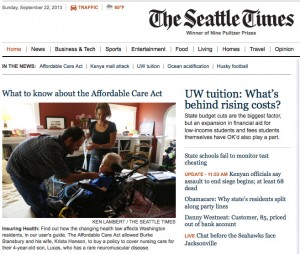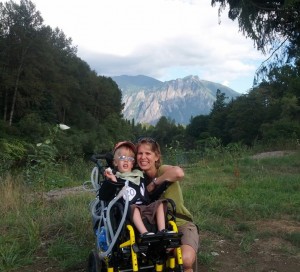“Lucas, the Obamacare success story” – and dreaming of an even better article in the Seattle Times (Sept. 24)
 On Sunday morning Burke got a text from a friend saying that Lucas was on the front page of the Seattle Times. And when we went online, there we were at the top, featured as an example of a family who has benefited from the Affordable Care Act (ACA), otherwise known as Obamacare.
On Sunday morning Burke got a text from a friend saying that Lucas was on the front page of the Seattle Times. And when we went online, there we were at the top, featured as an example of a family who has benefited from the Affordable Care Act (ACA), otherwise known as Obamacare.
It was an exciting moment – reassuring to have trusted reporters with our story and feel like they got it right, gratifying to know that Lucas’s story can help put a face (and dare we say, a pretty irresistible face) on the importance of expanding health coverage. It’s also exciting that in a time of so much bad news – paralyzing budget battles in Congress, growing inequality, climate change disasters, as so on – that its possible to be part of a media piece that features good news: millions of people in Washington state and across the country will soon have access to health insurance, and therefore health care. The Seattle Times piece is relatively short and posted in full at the end of this post.
Lucas is taking his new fame in stride. His teachers, therapists, and principal were all full of congratulations yesterday. We hadn’t even shown Lucas the article, but he’s so happy just to be back at school that he mostly ignored the hubbub.
The hard part of the whole thing is knowing how much further health care reform could have gone. While the ACA is making some critical, life-saving fixes to our broken health care system, it feels like it’s put a wimpy muzzle on an unwieldy and dangerous monster. (And we’re feeding the corporate beast at the same time by requiring people to buy private insurance.) It’s great that insurance companies can’t deny Lucas coverage because of a pre-existing condition. And it’s great that lifetime caps are gone, and that Medicaid will be expanded (in some states at least). All of these changes especially benefit people with disabilities and chronic illness, so of course we’re in favor.
But here’s the question: how is it that being forced to buy a second insurance plan for Lucas to cover his health care needs is somehow a happy ending? If you read our “positive” story closely, you could certainly imagine a better outcome. For example, imagine that we didn’t have to spend months battling with insurance companies to get Lucas the home nursing care he needs. Or imagine that we didn’t have to pay a second premium out-of-pocket… or argue with administrators over the phone to figure out which of his insurance companies would cover physical therapy…
And while we’re at it, let’s just imagine that the for-profit health insurance industry disappeared entirely… and that we all got improved Medicare-like benefits… and that EVERYONE could get the same coverage Lucas was entitled to, regardless of their income level? Of course it’s not politically likely any time soon, but we’re allowed to dream, right?
Note: You can read some previous rants we’ve written about Lucas and the health insurance industry here and here, and the full version of how we ended up with multiple insurance plans here.
——-
From the Seattle Times
Insurers must accept all children, even with pre-existing conditions
In the “old” system, Lucas’ pre-existing condition, a rare neuromuscular disease, would have prevented him from being able to get a child-only health-insurance policy.
Who: Burke Stansbury, 37; Krista Hanson, 36; and their son, Lucas Hanson, age 4. Burke works full time for a nonprofit organization; Krista is a part-time yoga instructor. They live in the Mount Baker neighborhood.
Circumstance: Lucas was born with a rare neuromuscular disease that severely limits him physically, but not mentally. He needs a ventilator to help him breathe and requires home nursing care.
Challenge: Lucas’ parents have group health insurance from a nonprofit that covers the specialists and equipment Lucas needs. But it doesn’t cover home nursing, necessary to make sure his breathing equipment functions properly.
In the “old” system, Lucas’ pre-existing condition would have prevented him from being able to get a child-only health-insurance policy. Although children in Washington are covered under Medicaid (and other programs), the private-duty nursing agency Burke and Krista found doesn’t take Medicaid.
Current coverage: The Affordable Care Act (ACA) requires that insurers must accept all children, even those with pre-existing medical conditions. So Burke and Krista were able to buy an individual child-only policy from Regence BlueShield for Lucas that helps provide the nursing care.
The future: The couple won’t qualify for subsidies under the ACA because their income is too high. But on their own they couldn’t afford the continuous nursing care Lucas needs, so they were grateful to be able to buy coverage.
And the ACA did one other thing that means a lot to them: It removed the lifetime limits on what insurers spend on a person’s care. Lucas’ first three months of life — spent in a neonatal intensive-care unit — already used up a good chunk of what used to be a typical $1 million lifetime limit.
Their view: “We feel very fortunate that [the Affordable Care Act] went into effect about the time we moved [to Seattle from Washington, D.C.],” Burke says. “Without nursing care, we wouldn’t be able to work.”
— Carol M. Ostrom
Also check out:

A user’s guide to the Affordable Care Act
20 things you need to know about the Affordable Care Act
More profiles of Washington residents and the health-care choices they face:













